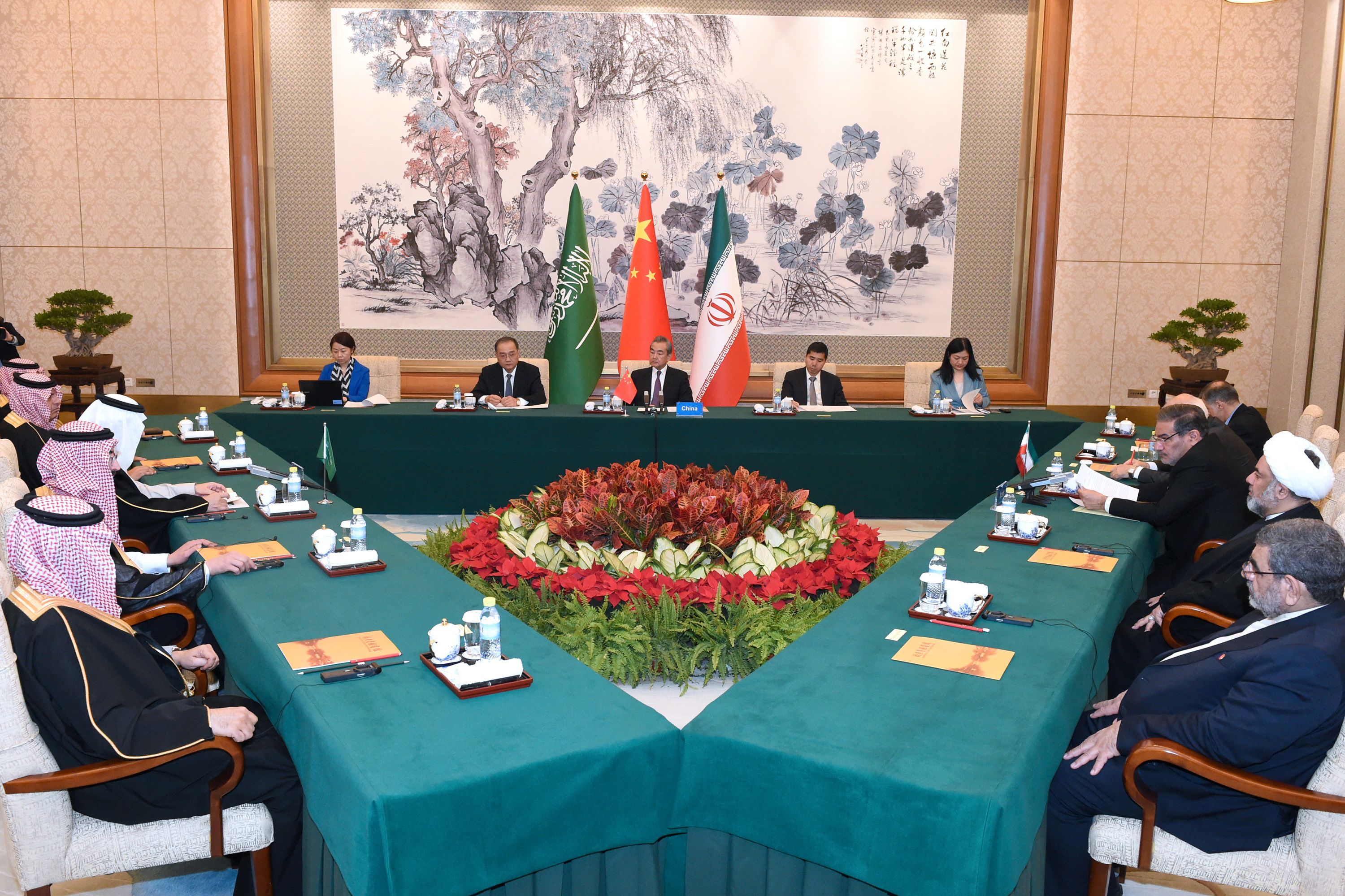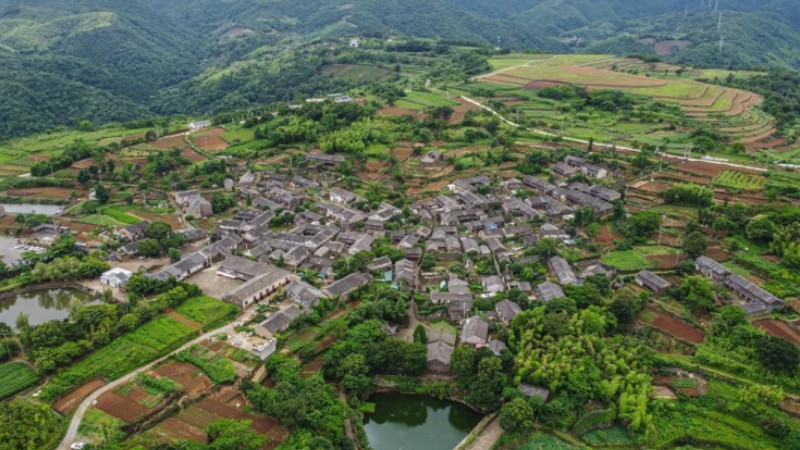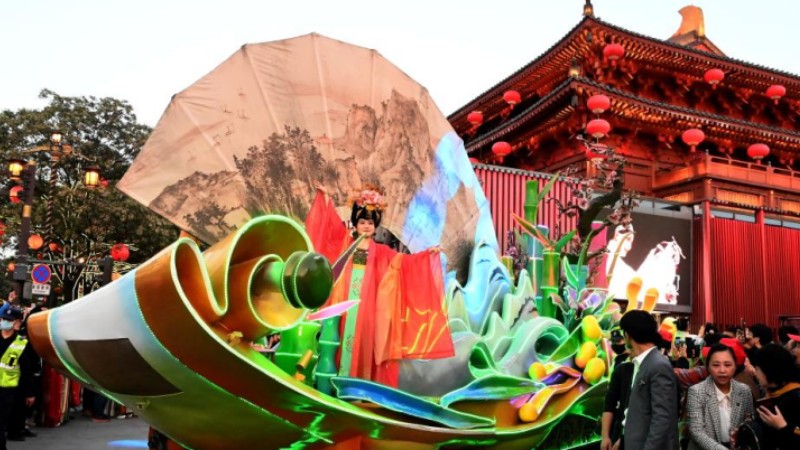Acting as a force for reconciliation, peace and harmony in the Middle East

Wang Yi (C), a member of the Political Bureau of the Communist Party of China (CPC) Central Committee and director of the Office of the Foreign Affairs Commission of the CPC Central Committee, attends a closing meeting of the talks between the Saudi delegation led by Musaad bin Mohammed Al-Aiban (L), Saudi Arabia's Minister of State, Member of the Council of Ministers and National Security Advisor, and Iranian delegation led by Admiral Ali Shamkhani (R), Secretary of the Supreme National Security Council of Iran, in Beijing, capital of China, March 10, 2023. (Photo: Xinhua)
With China's support, Saudi Arabia and Iran held talks in Beijing from March 6 to 10. On March 10, Saudi Arabia and Iran reached an agreement, and the three countries signed and released a joint statement announcing that Saudi Arabia and Iran agreed to resume diplomatic relations between them and carry out cooperation in various fields. On April 6, Chinese State Councilor and Foreign Minister Qin Gang witnessed the signing of a joint statement between Saudi Arabia's Foreign Minister Prince Faisal bin Farhan Al Saud and Iranian Foreign Minister Hossein Amir-Abdollahian in Beijing. The two countries announced the resumption of diplomatic relations with immediate effect.
China's successful mediation of the resumption of diplomatic relations between Saudi Arabia and Iran has been highly praised by the international community. Wang Di, Director-General of the Department of West Asian and North African affairs of the Ministry of Foreign Affairs, was interviewed by People's Daily. He spoke about the background and process of China's mediation to promote the resumption of Saudi Arabia-Iran diplomatic relations and what role China will play in the future Middle East.
Following is the full text of the interview:
Q: Saudi Arabia and Iran have resumed diplomatic relations. The international community highly praised China's significant role in the resumption of diplomatic ties between the two countries. What is the background of China's mediation efforts? Could you talk about the details of the mediation?
A: The Middle East has the most hotspot issues in the world. These hotspot issues have been around for a long time with various conflicts intertwined, making it very difficult to find a proper solution. Meanwhile, some major countries outside the region have been stirring up conflicts in this region and deliberately creating bloc confrontations for their own interests, resulting in long-term turbulence and great suffering of the people in the region.
Against this backdrop, it is the common aspiration of the people in this region to pursue peace and development and take control of their own future. Middle Eastern countries including Saudi Arabia and Iran have the will to resolve conflicts and contradictions through dialogue and consultation. They expect that responsible major countries will actively facilitate talks for peace to promote long-term stability in the region.
In December last year, President Xi Jinping paid a state visit to Saudi Arabia. In February this year, President Xi hosted Iranian President Ebrahim Raisi on his visit to China. During these visits, President Xi made personal efforts with the leaders of the two countries to support the development of good neighborly relations between Saudi Arabia and Iran. In the specific process of mediating the dialogue and promoting the resumption of diplomatic relations between Saudi Arabia and Iran, China has played an impartial, fair and balanced role as a reliable mediator.
As you may have noticed, at the closing meeting of the talks between the Saudi delegation and the Iranian delegation in Beijing on March 10, the seats of the Chinese, Saudi and Iranian delegations were arranged in an equilateral triangle, which reflects China's consistent position of advocating equality and mutual respect between nations.

Wang Yi, a member of the Political Bureau of the Communist Party of China (CPC) Central Committee and director of the Office of the Foreign Affairs Commission of the CPC Central Committee, presides over the closing meeting of the talks between a Saudi delegation and an Iranian delegation in Beijing, capital of China, March 10, 2023. (Photo: Xinhua)
In addition, at the group photo session of the closing meeting, China's top diplomat Wang Yi shook hands with both heads of the Saudi and Iranian delegations, symbolizing breaking the ice in Saudi-Iranian relations with the support of China. On April 6 when the Saudi-Iranian foreign ministers' meeting was held in Beijing, State Councilor and Foreign Minister Qin Gang held hands tightly with his two counterparts, symbolizing melting the ice of ties between Saudi Arabia and Iran.

Chinese State Councilor and Foreign Minister Qin Gang meets with Saudi Arabian Foreign Minister Prince Faisal bin Farhan Al Saud and Iranian Foreign Minister Hossein Amir-Abdollahian in Beijing, capital of China, April 6, 2023. (Photo: Xinhua)
Qatar's Al Jazeera borrowed the famous words of the Prophet Mohammed, "Seek knowledge even if you have to go as far as China" and praised "Seek peace, even if you have to go as far as China."
All this fully shows that China's mediation efforts have been fully recognized by both Saudi Arabia and Iran and are widely welcomed by countries and people in the region. China will continue to help Saudi Arabia and Iran take solid steps to improve their ties, create a better future and jointly promote security and development in the Middle East.
Q: What are China's unique advantages in the successful mediation and why did China's proposals receive positive responses from both countries?
A: Over the long term, China's diplomacy with the Middle East, under the leadership of the Communist Party of China and guided by Xi Jinping Thought on Diplomacy, has accumulated significant political and moral advantages.
Firstly, China upholds fairness and justice. China has always emphasized abiding by the purposes and principles of the UN Charter, respecting the sovereignty and independence of the Middle Eastern countries and the independent choice of the Middle Eastern people, and promoting political solutions to hotspot issues.
Secondly, China encourages unity and self-improvement. China actively develops relations with various Middle Eastern countries, actively promotes peace talks, and supports their independent exploration of solutions that all parties can accept.
Thirdly, China seeks win-win cooperation. The fruitful cooperation between China and Middle Eastern countries in building the Belt and Road Initiative and the pragmatic cooperation in various fields have achieved a higher-quality and deeper integration of interests.
Fourthly, China advocates for inclusiveness and mutual learning. China and the Middle Eastern countries have strengthened dialogue between civilizations, exchanged experiences in governance, and jointly opposed the theory of clash of civilizations, Islamophobia and the linking of terrorism to specific ethnic or religious groups, which has effectively promoted people-to-people connectivity.
These efforts have enabled China to establish friendly relations with various Middle Eastern countries and win broad trust. Middle Eastern countries including Saudi Arabia and Iran trust China as a fair mediator and are willing to listen to China's suggestions and proposals.
Q: In an interview with The Washington Post, former US Secretary of State Henry Kissinger compared the significance of the restoration of diplomatic ties between Saudi Arabia and Iran to Nixon's visit to China. Kissinger said, "China has in recent years declared that it needs to be a participant in the creation of the world order," and "It has now made a significant move in that direction." Does the successful mediation of the resumption of diplomatic ties between Saudi Arabia and Iran mean that China's diplomacy will play a greater and more proactive role in international affairs?
A: The small step of shaking hands and making peace between Saudi Arabia and Iran is a big step for humanity to overcome conflicts and achieve reconciliation. For China, the successful mediation of the restoration of ties between Saudi Arabia and Iran is a significant diplomatic practice in implementing China-proposed Global Security Initiative in the Middle East, demonstrating China's responsibility as a major country for promoting progress for humanity and seeking harmony for the world, and providing a significant positive impact for a turbulent world.
Today, the world is undergoing profound changes unseen in a century and human society is at a new crossroads. In the face of complex changes in the world, times and history, China will always adhere to its foreign policy goals of upholding world peace and promoting common development and is committed to promoting building a community with a shared future for mankind. China will stay committed to building a world of lasting peace through dialogue and consultation, a world of universal security through collaboration and shared benefits, a world of common prosperity through mutually beneficial cooperation, an open and inclusive world through exchanges and mutual learning, and a clean and beautiful world through green and low-carbon development. China will continue to play a constructive role in resolving current global hotspot issues in accordance with the wishes of all countries and will continue to bring new opportunities from the development of China to other countries including Middle Eastern countries.
Q: The relationship between Saudi Arabia and Iran has experienced twists and turns in history, affected by political entanglements and religious and historical factors that have existed for thousands of years. What challenges do you think their bilateral relations will face after their resumption of diplomatic relations through China's mediation? What role will China play in promoting relations between Saudi Arabia and Iran and peace and stability in the Middle East in the future?
A: Saudi Arabia and Iran are close neighbors in the Persian Gulf and have major influence in the Middle East and the Gulf region. In recent years, the relationship between Saudi Arabia and Iran has encountered some setbacks, but looking back on their exchanges that lasted for thousands of years, friendly exchanges are the mainstream. In particular, Saudi Arabia and Iran have jointly launched several mechanisms such as the Organization of Islamic Cooperation (OIC) and the Organization of the Petroleum Exporting Countries (OPEC), which promoted the unity and cooperation of developing countries in related fields.
The reconciliation and resumption of diplomatic relations between Saudi Arabia and Iran has turned a new page in the relations between the two countries, set a good example for resolving contradictions and differences via dialogue and consultation, and strengthened the momentum of reconciliation and dialogue in the Middle East, which has been widely supported by the people in the region and highly praised by the international community. We are glad to see that after the resumption of diplomatic relations, delegations from the two countries have visited each other and the two countries prepared to reopen embassies and missions. The two heads of state have received visit invitations from each other, further consolidating the momentum of improving bilateral relations.
A long journey can be covered only by taking one step at a time. An Arab saying goes, "People who act patiently will realize their wishes", and the Persian proverb says "With time and patience, the mulberry leaf becomes satin." It is believed that with the joint efforts of the two countries, Saudi-Iranian relations will continue to take firm steps on the path of good neighborliness, and China is willing to continue to play a constructive role in this regard. Meanwhile, China will continue to uphold justice, contribute Chinese wisdom, put forward Chinese proposals and play our due role in seeking settlement of the region's other hotspot issues. China will be a facilitator for peace and stability, a cooperative partner for development and prosperity, and an enabler for building strength through unity.
Q: What are the main objectives of China's participation in coordinating regional affairs in the Middle East at the current stage? What approach has China adopted?
A: The Middle East is located in a prominent and strategic position. With its abundant energy resources, hotspot issues have emerged. Therefore, the region is in an important position in the global landscape in terms of politics, economics, energy and security. Its security and stability are not just about the residents' well-being, but about the peace and development of the whole world.
China and Middle Eastern countries are good friends and good partners. Both sides have built a strong basis for political mutual trust. We have been witnessing fruitful results yielded from the Belt and Road Initiative and exchanges between our civilizations. So far, China has established comprehensive strategic partnerships or strategic partnerships with 12 countries in this region.
In December 2022, the first China-Arab States Summit was successfully held. China and Arab states agreed to make all-out efforts to build a China-Arab community with a shared future in the new era and to raise their comprehensive cooperation, common development and future-oriented China-Arab strategic partnership to a new level.
For years, China has been committed to promoting the political settlement of regional hotspot issues and promoting the stability and development of the Middle East. In recent years, China has proposed a five-point initiative on achieving security and stability in the Middle East, a four-point proposal for the political settlement of the Syria issue, a three-point vision for the implementation of a two-state solution between Palestine and Israel, and the establishment of a multilateral dialogue platform for the Persian Gulf region. China has also been advocating a common, comprehensive, cooperative and sustainable security architecture in the Middle East. All these efforts have been welcomed and affirmed by the Middle Eastern countries.
China will as always respect Middle Eastern countries as the masters of their own affairs. China will support the countries in adhering to strategic independence, strengthening solidarity and cooperation and opposing external interference, and act as a force for reconciliation, peace and harmony in the Middle East. China will join hands with Middle Eastern countries to implement the Global Security Initiative, the Global Development Initiative and the Global Civilization Initiative, and to promote security, stability, development, prosperity, inclusiveness and harmony in the region.
Photos
Related Stories
- China's sincere hope to promote security, stability in Middle East
- Signs of reconciliations in Middle East Emerge
- Middle East welcomes China's role as peace builder, rejects US determinism
- Xi: Build on Saudi-Iranian reconciliation
- China calls for diplomatic efforts regarding JCPOA
- Crimes U.S. has committed in Middle East: Transplanting American-style democracy, stirring up trouble
- U.S. is biggest human rights saboteur in Middle East and beyond, experts say
- Plundering, killing among numerous crimes U.S. commits in Middle East
- US seriously violating int'l law in Middle East: experts
- Chinese envoy urges advancing two-state solution to address Palestinian issue
Copyright © 2023 People's Daily Online. All Rights Reserved.









